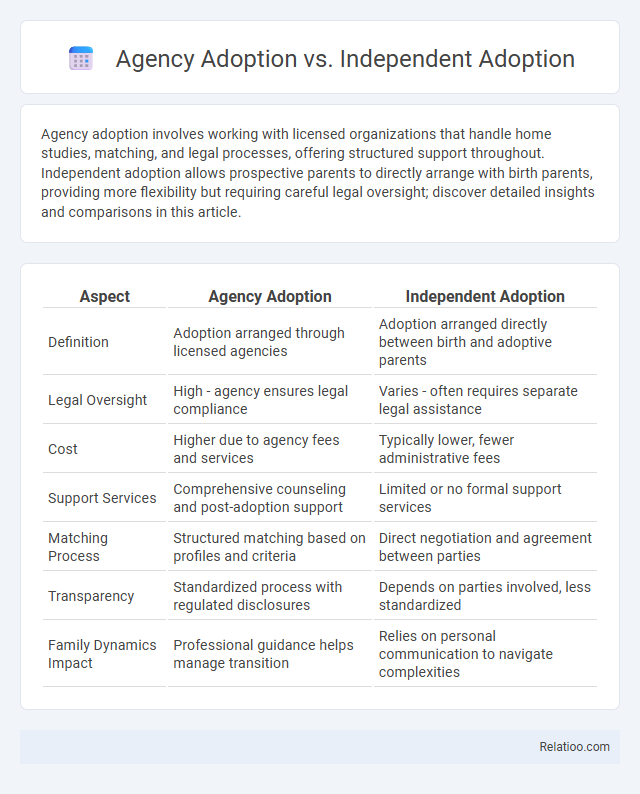Agency adoption involves working with licensed organizations that handle home studies, matching, and legal processes, offering structured support throughout. Independent adoption allows prospective parents to directly arrange with birth parents, providing more flexibility but requiring careful legal oversight; discover detailed insights and comparisons in this article.
Table of Comparison
| Aspect | Agency Adoption | Independent Adoption |
|---|---|---|
| Definition | Adoption arranged through licensed agencies | Adoption arranged directly between birth and adoptive parents |
| Legal Oversight | High - agency ensures legal compliance | Varies - often requires separate legal assistance |
| Cost | Higher due to agency fees and services | Typically lower, fewer administrative fees |
| Support Services | Comprehensive counseling and post-adoption support | Limited or no formal support services |
| Matching Process | Structured matching based on profiles and criteria | Direct negotiation and agreement between parties |
| Transparency | Standardized process with regulated disclosures | Depends on parties involved, less standardized |
| Family Dynamics Impact | Professional guidance helps manage transition | Relies on personal communication to navigate complexities |
Understanding Agency Adoption
Agency adoption involves working with licensed adoption agencies that provide comprehensive support services such as home studies, matching, counseling, and legal assistance, ensuring a structured and legally compliant process. Independent adoption, by contrast, is arranged directly between birth parents and adoptive parents without an agency intermediary, often requiring more personal management of legal and logistical steps. Understanding agency adoption highlights its benefits in offering professional guidance, security, and adherence to state and federal adoption regulations.
Exploring Independent Adoption
Exploring independent adoption reveals a process where prospective parents work directly with birth mothers or attorneys, offering more personalized control compared to agency adoption. Independent adoption often involves fewer fees and less bureaucracy, enabling a tailored experience for both birth parents and adoptive families. This approach requires thorough legal guidance to ensure compliance with state laws and protect all parties' rights throughout the adoption journey.
Key Differences: Agency vs Independent Adoption
Agency adoption involves licensed adoption agencies that provide structured support, including home studies, matching, and counseling, ensuring compliance with legal regulations. Independent adoption is arranged directly between birth parents and adoptive parents, often facilitated by attorneys, offering more personalized but less regulated processes. Key differences include the level of agency involvement, legal oversight, cost variations, and the nature of support services provided throughout the adoption journey.
Legal Requirements for Each Adoption Path
Agency adoption requires prospective parents to comply with both state and agency-specific regulations, including mandatory home studies and background checks. Independent adoption involves direct arrangements between birth parents and adoptive parents, often necessitating court approval to ensure all legal consent and documentation are properly completed. Adoption through public agencies emphasizes adherence to state child welfare laws, including termination of parental rights and licensed social worker evaluations to protect the child's best interests.
Costs Involved in Both Adoption Methods
Agency adoption typically involves higher upfront costs, including agency fees, home study expenses, and legal fees, which can total between $20,000 and $40,000 depending on the agency and location. Independent adoption may reduce agency fees but still requires payment for legal services, home studies, and birth parent expenses, often resulting in costs ranging from $15,000 to $30,000. Understanding these financial differences helps you budget more effectively and choose the adoption method that best fits your economic situation.
The Role of Adoption Professionals
Adoption professionals play a critical role in agency adoption by providing structured support, legal guidance, and matching services to prospective parents and birth families through licensed agencies. In independent adoption, adoption attorneys and facilitators often step in to navigate legal complexities and ensure compliance with state laws, offering a more personalized yet less regulated process. Adoption professionals ensure ethical practices, facilitate open communication, and help manage the emotional dynamics involved in all types of adoption, safeguarding the well-being of both birth parents and adoptive families.
Advantages of Agency Adoption
Agency adoption offers professional guidance, increasing the likelihood of a smooth and legally compliant process. You benefit from tailored support, including counseling, home studies, and post-placement services, which ensure better preparation and follow-up. This structured approach often results in quicker placements and access to a wider pool of adoptive children.
Benefits of Independent Adoption
Independent adoption offers personalized matching between birth parents and adoptive families, fostering direct communication and stronger emotional connections. This approach often results in reduced agency fees, making it more cost-effective compared to agency adoption. Independent adoption provides greater flexibility and control over the adoption timeline and process, allowing families to tailor the experience to their specific needs.
Challenges Unique to Each Adoption Process
Agency adoption often involves extensive paperwork, agency fees, and strict eligibility criteria that can delay placement and increase costs. Independent adoption challenges include finding a willing birth parent and navigating legal complexities without agency support, leading to potential risks of inconsistencies in home studies or legal documentation. Domestic adoption faces issues like limited availability of infants, lengthy waiting periods, and emotional strain from uncertain timelines and birth parent decisions.
Making the Right Choice for Your Family
Choosing between agency adoption, independent adoption, and general adoption depends on your family's unique needs, budget, and desired level of involvement in the process. Agency adoption offers structured support and thorough screening, while independent adoption provides more direct communication with birth parents but requires careful legal guidance. Understanding these options ensures you make the right choice for your family's future and emotional well-being.

Infographic: Agency Adoption vs Independent Adoption
 relatioo.com
relatioo.com